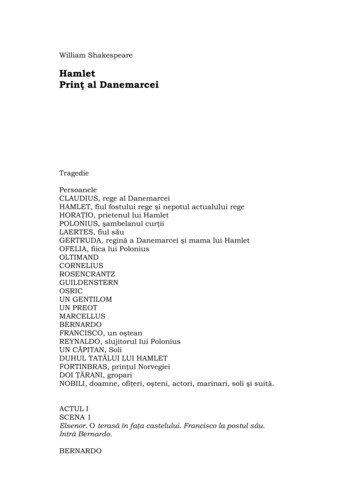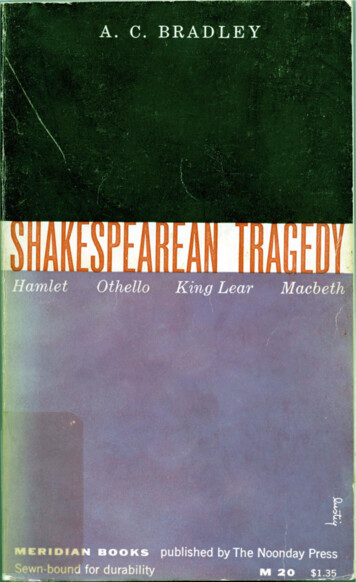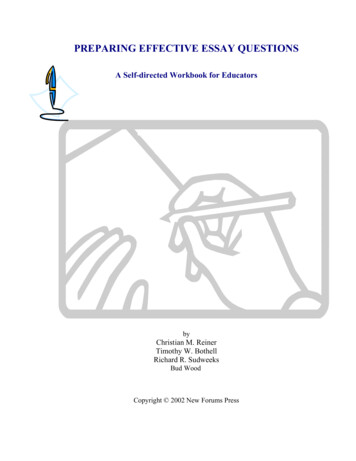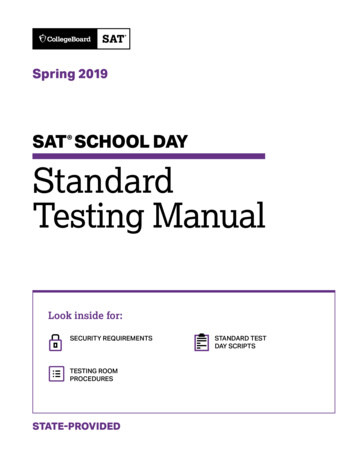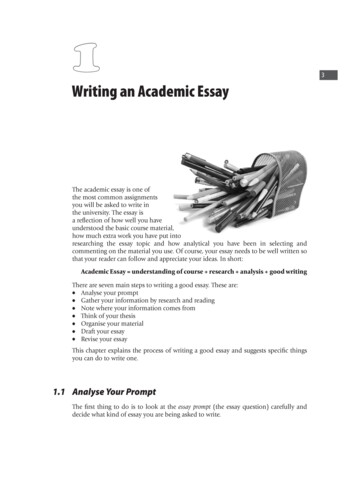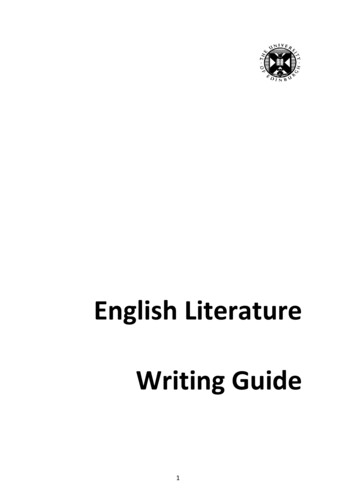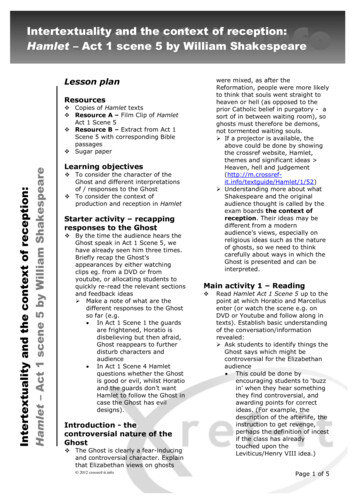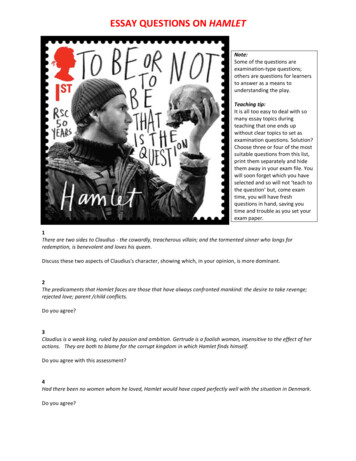
Transcription
ESSAY QUESTIONS ON HAMLETNote:Some of the questions areexamination-type questions;others are questions for learnersto answer as a means tounderstanding the play.Teaching tip:It is all too easy to deal with somany essay topics duringteaching that one ends upwithout clear topics to set asexamination questions. Solution?Choose three or four of the mostsuitable questions from this list,print them separately and hidethem away in your exam file. Youwill soon forget which you haveselected and so will not ‘teach tothe question’ but, come examtime, you will have freshquestions in hand, saving youtime and trouble as you set yourexam paper.1There are two sides to Claudius - the cowardly, treacherous villain; and the tormented sinner who longs forredemption, is benevolent and loves his queen.Discuss these two aspects of Claudius's character, showing which, in your opinion, is more dominant.2The predicaments that Hamlet faces are those that have always confronted mankind: the desire to take revenge;rejected love; parent /child conflicts.Do you agree?3Claudius is a weak king, ruled by passion and ambition. Gertrude is a foolish woman, insensitive to the effect of heractions. They are both to blame for the corrupt kingdom in which Hamlet finds himself.Do you agree with this assessment?4Had there been no women whom he loved, Hamlet would have coped perfectly well with the situation in Denmark.Do you agree?
5Polonius is not a major character in the sense that Hamlet and Claudius are: yet he is apparently a leading figure inthe court, he is directly or indirectly involved in much of the main action, and his accidental murder at Hamlet'shands is certainly a 'major' event of considerable significance and dramatic import.What is your view of Polonius' role in the play? Refer in particular to the dramatic importance of his death.6“O God, Horatio, what a wounded name,Things standing thus unknown, shall I leave behind me!If thou didst ever hold me in thy heart,Absent thee from felicity awhile,And in this harsh world draw thy breath in painTo tell my story."Imagine that you are Horatio and that you have been invited to write an account of your dealings with Hamlet,giving your interpretation of "his story". Decide what sort of name (reputation) you wish to have left behind forHamlet - and then tell his story accordingly.7Hamlet asks of his father's ghost in Act 3 Scene 4, lines 106 - 108:"Do you not come your tardy son to chide,That, lapsed in time and passion, lets go byThe important acting of your dread command?"To what extent do you agree with Hamlet's assessment of himself at this stage of the play? Pay particularattention to the highlighted words.8Some readers believe Hamlet procrastinates after the Ghost's direct statements, " Revenge his foul and mostunnatural murder," and "The serpent that did sting thy father's life/Now wears his crown." Others say heimmediately puts his plans in action.What is your view? Argue in support of your opinion, showing your understanding of Hamlet's procrastination oraction throughout the play.9Hamlet's behaviour throughout the play has consequences (for Denmark and for the people with whom he mixes)which he would not have expected or planned.Discuss.10"Therefore, since brevity is the soul of wit,And tediousness the limbs and outward flourishes,I will be brief. Your noble son is mad.Mad call I it; for to define true madness,What is it but to bed nothing else but mad?"(Polonius)
There have been many discussions about whether or not Hamlet was mad. Polonius was convinced he knew theanswer. Hamlet declared that he was only mad occasionally and Fortinbras and Horatio do not raise the issue.Even Laertes, who was mad with anger as a result of his father's murder and Ophelia's insanity, does not dismissHamlet as a madman. With whom do you side? Why?11Hamlet is no “sweet prince”. In pursuit of his revenge he becomes increasingly ruthless, callous and cruel.In the light of the above statement examine Hamlet's relationships with the other characters in the play anddecide whether or not you agree with the comment.12Daughter, sister, lover - in all these relationships Ophelia simply accepts the fact that she is being dominated.Do you agree?13A man of spontaneous action rather than one who is given to contriving and plotting.How acceptable do you find this comment on Hamlet's character? Discuss with reference to the incidents in theplay.14What different aspects of Hamlet's character are brought out by his dealings with TWO of the following:(i)Horatio(ii)Ophelia(iii)Rosencrantz and Guildenstern15Hamlet is placed by Fate in a position where his noble qualities are made ineffective by his fatal indecision.Discuss the character of Hamlet in the light of this comment, illustrating your answer from the play itself.16In Hamlet Shakespeare explores the relationships between various children and their parents. He looks at theinfluence a parent has on a child and the value of parental guidance.Discuss this aspect of the play taking into account Polonius and his children and Hamlet and his parents.(Your answer should concentrate more on Hamlet than on Polonius.)17Write an essay in which you discuss what the play has to say about political power and the use and abuse of suchpower.18In the course of the play, Hamlet grows up.Do you agree completely, partly, or not at all? Explain your opinion.
19'Although Hamlet sometimes disappoints loved ones, tells lies, and even murders, we are still able to sympathisewith him.”Discuss this statement in an essay of about 1½ pages, showing clearly whether you believe this to be true.20There are many contrasts in the play, Hamlet. For example: there is honesty but also dishonesty, faithfulness andinfidelity, love and hatred, honour and dishonour, revenge and forgiveness. This suggests that nothing was simple,nothing was easy.And for the three hours of the play we, the audience, find ourselves constantly swept from one opinion to theopposite. Sometimes we agree with what is happening on stage, at other times we find it disgusting.This is why it is difficult to decide exactly what kind of person Hamlet is.Discuss.21A 'foil' is anything that by contrast of some kind makes more apparent the quality or qualities of something else.Three of Hamlet's foils are young men who, like Hamlet, have, or imagine they have, good cause for revenge. Theyare Laertes, Fortinbras and Pyrrhus (the young Greer warrior in the play-extract spoken by Hamlet and the FirstPlayer).If you compare and contrast Hamlet with each of these characters, how does it affect your understanding of him?Deal with these three foils one by one.22There are only two female characters in Hamlet: Gertrude and Ophelia. What are these two? Innocent dupes?Manipulated victims of a patriarchal (male-dominated) society? Cunning self-seekers who at least partly deservetheir fates? All of the above? None of the above? Is it even valid to discuss them in the same breath?What do you think?23“Confused, bewildered and frightened""Conniving, cunning and in full control"Consider and discuss the character of Hamlet in the light of these two extremes.24“There are many subjects in Hamlet. There is politics, force opposed to morality. There is the tragedy of love as wellas family drama. There is everything you want, including deep psychological analysis, a bloody story, a duel, andgeneral slaughter.”Jan Kott: Shakespeare Our Contemporary
Select one of the issues raised by Kott in the above statement and, referring to the play, show how this play hastaken on universal appeal and value.25"Bear Hamlet, like a soldier, to the stage;For he was likely, had he been put on,To have proved most royal: and for his passage,The soldier's music and the rite of warSpeak loudly for him."Fortinbras believes that if Hamlet had been faced with the responsibility of kingship, he would have been a fineking, and orders that Hamlet be accorded the funeral honours of a royal warrior.Do you agree with this viewpoint? Discuss the idea, referring to this and other passages in the play.26"Hamlet, the man, represents a type of individual greatness that is not bound by time or space. He andhis philosophisings are as real and as topical today as they must have been in Shakespeare's time."Discuss this statement with reference to the text.27"There is a divinity which shapes our ends,Rough-hew them how we will."Hamlet utters these words in Act V scene 2 on his return to Denmark. A subtle change seems to have come overhim; in what way is the above quotation indicative of this change? From your knowledge of the play as a whole,would you say that this philosophy is vindicated?28Why does Hamlet procrastinate in carrying out the ghost's instructions? Is Hamlet a coward or a hero? WhenHamlet finally does kill Claudius, is it not perhaps the best time to have done so?29Consider aspects of Hamlet, Prince of Denmark that make this play a tragedy. (Besides the structure of the play,think of Hamlet's isolation - he also rises far above the other characters in the play - his betrayal, his wastedpotential, his being a "victim of circumstances", et al.)30In many ways Hamlet is an anachronism in the play . He represents a "new" type of independent thinking; arational, intellectual approach to moral problems more in keeping with a much later age of intellectualenlightenment; he needs to justify his actions to himself - he has a moral conscience; and it is this sense ofpersonal integrity that accounts for his hatred of deception.Discuss.31To what extent, do you think, is Shakespeare presenting Hamlet as a type of ideal man? (Your answer must includean assessment of Hamlet's procrastination. Does this vindicate the theory of Hamlet as an ideal or is it a flaw in hischaracter?)
Consider aspects of Hamlet, Prince of Denmark that make this play a tragedy. (Besides the structure of the play, think of Hamlet's isolation - he also rises far above the other characters in the play - his betrayal, his wasted potential, his being a "victim of circumstances", et al.) 30 In many ways


